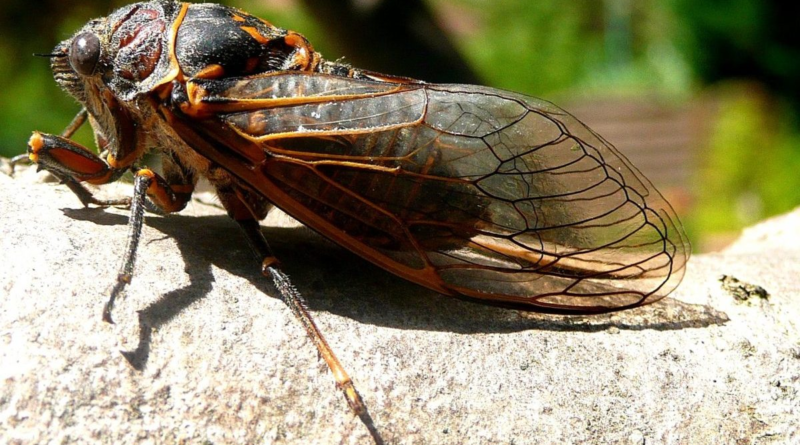Weird News: Amphetamine Fungus Infects Cicadas – The Paper
The Paper.
Local. Independent. Alternative. Albuquerque.
Some members of Brood X—a brood of trillions of cicadas that emerges every 17 years to breed—are reportedly becoming infected by a fungus that makes them lose the lower half of their bodies and become overly sexual.
According to NPR a fungus called Massospora has infected a small number of the cicadas. The fungus produces an amphetamine known as cathinone that causes the insects to shed their lower abdomens. A “white plug of fungus” then replaces the lost body part. “It looks as if the backside of the cicada is being replaced either by chalk or by like one of those nubby middle school erasers,” Matt Kasson, associate professor of forest pathology and mycology at West Virginia University, told NPR’s All Thing’s Considered.
The fungus then increases the cicadas’ sexual drive, leading them to mate with as many partners as possible. Infected males will continue mating with females, but will also pretend to be females to spread the fungus to other males. “This is stranger than fiction,” he said, “to have something that’s being manipulated by a fungus, to be hypersexual and to have prolonged stamina and just mate like crazy.”
The fungus then spreads to other cicadas through sexual contact. “It’s sexually transmissible,” said Kasson. “It’s a failed mating attempt, of course, because there’s no genitalia back there.”
The fungus acts differently in cicadas with a yearly mating cycle, however. Instead of producing an amphetamine, the fungus uses psilocybin to affect the insects.
Kasson says the fungus only infects 5 percent of Brood X and doesn’t appear to cause any pain in its hosts. “Everybody’s having a good time while they’re infected,” he says. “So I don’t imagine there’s much pain—maybe a desire to listen to the Grateful Dead or something like that—but no pain.”
A city in California has been ordered to pay $350,000 to two independent journalists after it accidentally sent them private records, then accused them of hacking.
According to Ars Technica, the city of Fullerton, Calif., will be paying the large sum to bloggers Joshua Ferguson and David Curlee to settle a lawsuit that it brought against the pair for allegedly hacking the city Dropbox account.
The case stems from a series of blog posts written by Ferguson and Curlee in June 2019 on Friends for Fullerton’s Future. The posts described incidents involving Fullerton city employees that were being investigated by police internal affairs and were sourced from private internal emails. The city sent two cease and desist letters to the bloggers, instructing them to immediately remove the blog entries.
The city then filed a restraining order in October 2019 and requested that the bloggers be forced to stop publication, surrender the stolen emails and submit their personal computers for analysis by a third-party forensic firm. A judge granted the restraining order, but it was overturned in an appellate court. In November 2019 the city filed a lawsuit against the bloggers alleging violations of the Computer Fraud and Abuse Act and California’s Comprehensive Computer Data Access and Fraud Act.
According to court reports, in June 2019, Ferguson and Curlee made public record requests related to police misconduct and were sent an email from a city employee containing a link to a Dropbox folder that was not password protected. Inside the folder were records request documents that had not been reviewed by the city attorney. The pair downloaded the files and looked through them. They discovered emails detailing incidents like an insurance claim against an allegedly drunk city employee who was involved in an auto accident and others.
The Ferguson City Council voted last week to settle the suit after advocate groups publicly came out in support of the bloggers. The settlement requires it to pay $350,000 to the bloggers and post a public apology on its website.
Big-box chain Target has announced a temporary halt on the sale of Pokémon trading cards—presumably over concerns for customers’ health.
The New York Times reports that the trading card came, introduced in the U.S. in 1998, has gained massive popularity during the pandemic. Sales of the game’s merchandise have reportedly skyrocketed in recent months, leading to an increase in demand among its fan base. According to Vice, resellers and collectors have been lining up at Target stores hours before opening to gain access to highly sought-after merchandise that can be resold at higher markups online.
Due to the unruly behavior of some of these shoppers, over the last few months Target instituted first a three-item purchase limit and then a one-item purchase limit in an attempt to gain control of the situation.
But last week the company announced it would temporarily suspend the in-store sale of Pokémon collectible card merchandise altogether “out of an abundance of caution,” according to a statement. A spokesperson told reporters, “The safety of our guests and our team is our top priority.”
A California gubernatorial candidate is under investigation for bringing a 1,000 lb. bear to campaign rallies.
The Guardian reports that The San Diego Humane Society’s law enforcement division is currently investigating John Cox, a candidate to replace Gavin Newsom in California’s potential gubernatorial recall election, for making appearances with Tag, an over-1,000 lb. Kodiak bear. San Diego law forbids anyone not associated with a zoo from bringing a wild animal into the city.
Cox says the bear has been treated well and dismissed complaints from “leftwing activists.”
Florida wildlife officers were sent to a Wendy’s fast food restaurant last week to intercept an alligator that was harassing customers in the parking lot.
According to Fox35 in Florida, Lee County police were alerted to the dangerous creature encounter and sent Florida Fish and Wildlife Commission to wrangle the beast. “He may have just been ‘hangry’ for a cheeseburger, but he gave many quite the scare!” wrote the Lee County Sheriff’s Twitter account.
The animal was relocated safely. No injuries were reported.
Advertisers pay to print and distribute The Paper, but as independent journalists we rely on contributions from readers like you to fund our journalism.
Your contribution is appreciated.
Arts. Culture. Food. Community. In your inbox each week before The Paper hits news stands.
We’ve recently sent you an authentication link. Please, check your inbox!
Sign in with a password below, or sign in using your email.
Get a code sent to your email to sign in, or sign in using a password.
Enter the code you received via email to sign in, or sign in using a password.
Sign in with your email
Lost your password?
Try a different email
Send another code
Sign in with a password
Terms & Conditions



